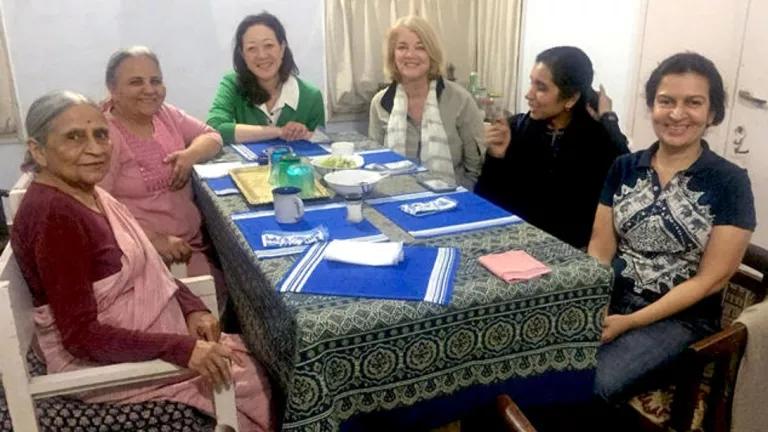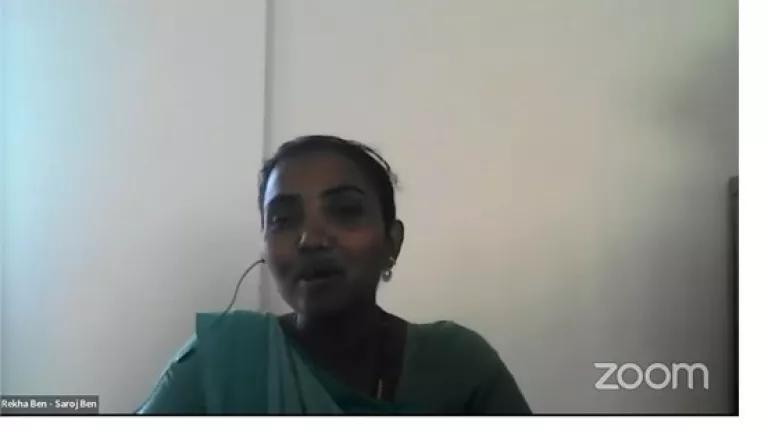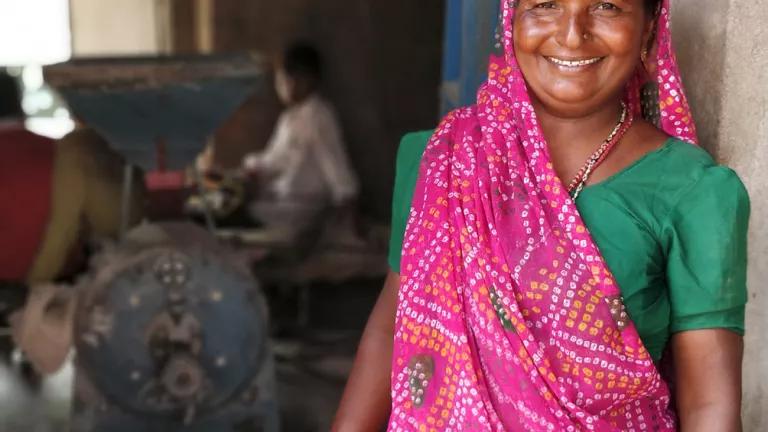
Ela Bhatt, SEWA Founder, and Reema Nanavaty, SEWA Rural, meet with women leaders at NRDC in Ahmedabad.
The powerful relationship between women and climate change came into focus during a conversation with Reemaben Nanavaty, the head of Self-Employed Women’s Association (SEWA) in rural Gujarat. Nearly 10 years ago, Reemaben explained to me how SEWA and NRDC could work together to “bring women into the climate debate.”
Reemaben emphasized that the framing of women as a vulnerable group to climate change is irrefutable, but more needs to be done. We need to work together to have solutions developed and led by women. “Women belong in all places where decisions are being made,” inspiring words from the late U.S. Supreme Court Justice Ruth Bader Ginsburg still ring true today.
To celebrate International Women’s Day, this photo essay highlights the strong partnerships and solutions that NRDC has worked on in India and around the world. International Women’s Day is the annual celebration of the “social, economic, cultural and political achievements of women.” The day also aims to advance gender equality and this year’s theme is to #BreakTheBias.

Women on the Frontlines of Climate Solutions
Equity and building inclusive climate solutions are a priority for NRDC’s work in India. In our initial project, “Worth Their Salt”, NRDC and SEWA partnered with women “agariyas” or salt farmers to transition salt production away from expensive and polluting diesel and toward more efficient, solar and solar-hybrid water pumps. We worked to build skills and improve livelihoods in Gujarat through clean energy solutions for over 43,000 families with a 94% annual income increase. The partnership has scaled with NRDC and SEWA’s Green Village Energy Plans as part of Hariyali: Green Villages initiative, developing policy and market solutions to reduce energy poverty and increase jobs in rural India.

SEWA members with NRDC women leaders at Salt Pans in Little Rann of Kutch
Women Leading Climate Policy
From the national level at the Ministry of Environment, Forests and Climate Change to the local level, women are critical to implementing climate solutions. NRDC and partner’s groundbreaking work on heat action plans and cool roofs received the 2020 Ashden Award on cool cities. NRDC was deeply humbled to share the award with many partners, including Mahila Housing Trust (MHT), a women-led group installing cool roofs in slum and lower income communities in Ahmedabad, Gujarat.

Ahmedabad Mayor Bijal Patel presents a knowledge partner awards to NRDC's Susan Casey-Lefkowitz and India team
Women in International Climate Leadership
As an emerging economic powerhouse with the second largest population, India is working to bring millions of people out of poverty while fighting climate change. As the third largest climate emitter, India is already experiencing the disastrous effects of climate change, as discussed in the recent IPCC report on adaption. Clean energy is at the heart of India’s climate goal of committing to 50% of India’s electricity generation from non-coal or gas sources by 2030. India is a leader in clean energy, especially solar and wind energy. NRDC and partners have consistently supported strong climate action, including the Paris Agreement and Kigali Amendment to the Montreal Protocol, working with women leaders in India and around the world.

NRDC's Frances Beinecke and Anjali Jaiswal discussing climate resilience during climate talks in Paris
Women in Climate Science Leadership
Women and girls are among the most impacted by climate change, as discussed by my colleague, Dr. Kim Knowlton. Women have the chief responsibility as caregivers, helping elders get out of harm’s way during a flood or taking children to the doctor during a heat wave. Given these experiences, women are often more attuned to the effects of climate change on natural resources and, by extension, on their families’ and communities’ well-being. NRDC is honored to work with top women scientist on groundbreaking research on climate change, extreme heat, air pollution and more with partners, such as the Indian Institute of Public Health Gandhinagar, The Energy and Resources Institute, the Administrative Staff College of India, and the Council on Energy, Environment and Water.

Heat health knowledge exchange in New York City with leading women scientists from India, including Sec. Sujatha Saunik, Dr. Priya Dutta, Dr. Lipika Nanda and others
Women are agents of change. We play critical roles in our communities. Our voices must be heard for climate action. To solve the climate crisis, women must have a seat at the table.
This blog post is in loving memory of Chhaya Bhavsar, a sister from SEWA who worked tirelessly for the empowerment of rural women in India.

Jessica Korsh contributed to this blog post.
This blog was updated to add the MNRE tweet on International Women's Day.



